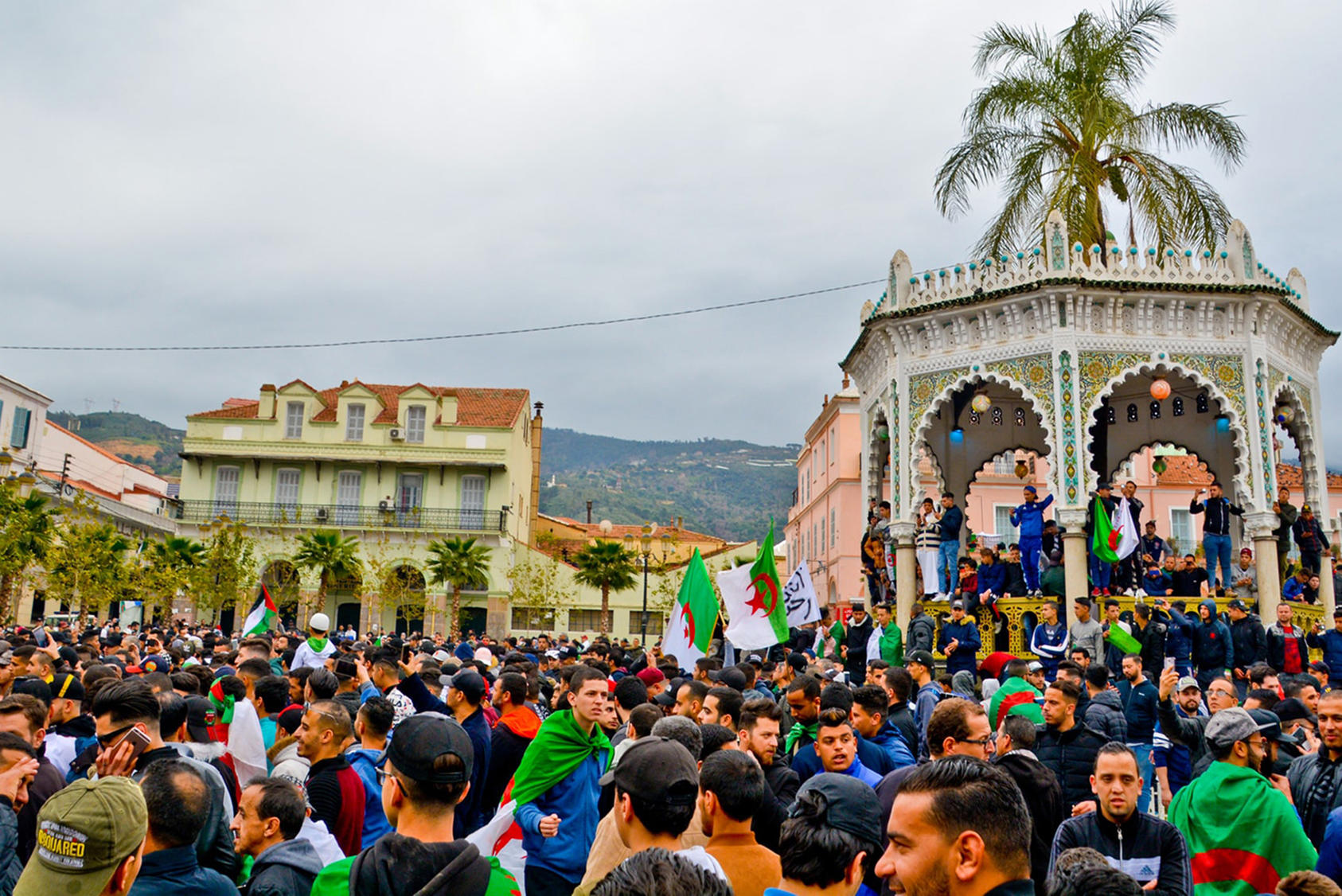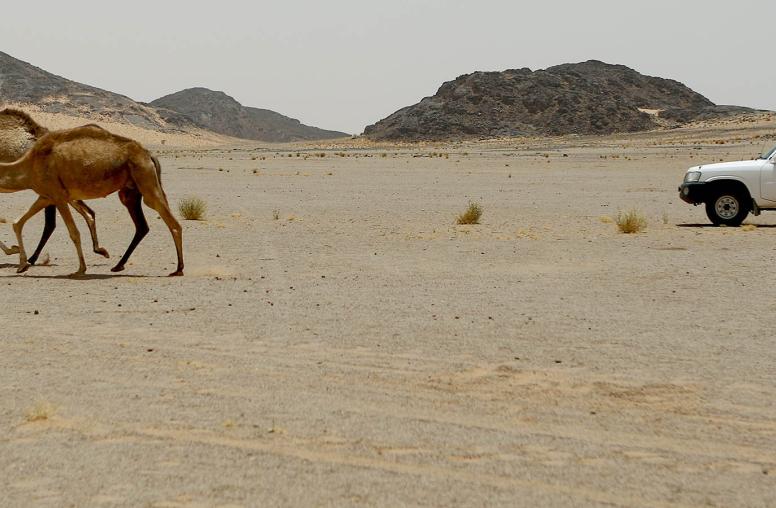Will Algeria’s Protests Lead to Change and a Second Arab Spring?
The movement has forced President Bouteflika to not run for a fifth term, but there’s a long road ahead for reform.
In response to nationwide protests, Algerian President Abdelaziz Bouteflika announced he would not seek a fifth term to extend his 20-year rule. Bouteflika’s decision was greeted with celebration by the protesters, who saw it as the first victory in a potential democratic revolution. However, the upcoming presidential elections have been delayed, effectively allowing Bouteflika and a small group of ruling elites to govern indefinitely. What follows for Algeria is an uncertain period, one that echoes the “Arab Spring” that swept through the region in 2011. USIP’s Thomas Hill discusses Algeria’s future and the possibility of a second “Arab Spring” on the horizon.

In 2011, the Arab Spring didn’t really take hold in Algeria. So, why now? What circumstances have led to the current protests?
When protests in Algeria started at the end of 2010, the Bouteflika regime was quick to introduce expanded subsidies, increased employment in the public sector, and promises of forthcoming political reform. There was also a swift crackdown on perceived agitators, especially members of the press, who the regime deemed a national security threat. The government’s actions successfully prevented mass social unrest but did nothing to address the underlying grievances—the same grievances that fueled protests elsewhere across the Middle East and North Africa in 2011.
The relatively low cost of oil ($60 per barrel) and the diminishing foreign reserves of the Algerian government have made it hard to sustain the bloated public sector expenditures and subsidies introduced in 2010. During the same period, promised political reforms were not implemented and the performance of government institutions continued to decline. The corruption, inefficiency and ineffectiveness of state institutions has meant that government is largely unresponsive to the Algerian people.
The final straw seems to be President Bouteflika’s announcement that he would run for a fifth consecutive term in an election where the outcome was clearly predetermined. This brazen disregard for even the appearance of a participatory electoral process was too much and the Algerian people took to the streets.
Now, a more cynical analysis would say that while all the above is true, the tipping point that brought the Algerian people to the streets was the invisible support of powerful members of the ruling clique (known as le pouvoir). These political-military elites have been locked in a decades long power struggle with President Bouteflika—and his brother Said and Army Gen. Salah—and they saw Said and Salah trying to consolidate power for themselves. In response, the elites encouraged a popular rebellion to create an opportunity for themselves. This might be some truth to this conspiracy theory, but it would be difficult to verify.
In addition to dropping out of the race, President Bouteflika has also delayed the presidential elections. How have protesters greeted this news? Could it facilitate a peaceful transfer of power?
Initially, the decision by President Bouteflika to postpone elections until after a national dialogue has taken place was met with exuberance from the street protesters. However, it has not ended popular demonstrations but instead fanned the flames of those calling for change. I suspect that the street protests will continue to grow until a more detailed plan for transition is revealed and it is made clear that President Bouteflika will not serve as caretaker or guardian of the transition process.
At this point, I think it’s too early to tell where this all ends. I suspect that there will be an election of some kind in the next nine months but who will run and under what framework remain a mystery. Some of those details will be determined by the ferocity of the street protests.
If street protesters start to lose momentum, I think we’ll see a managed transition where the political-military elites come to some sort of understanding or detente and present a consensus candidate that wins in a carefully orchestrated democratic election process—a process where both the leading candidate and the opposition party are vetted individuals who are not radically different from one another.
If street protests continue and gain momentum in calling for an ouster of all the “old guard,” then there could be violence. In that scenario, I could see security services trying to hold on to power through a severe crackdown. We know that the Algerian security services have a history of responding to challenges with overwhelming force so it’s very possible, perhaps even certain, that if challenged in this way they will react with great violence.
Once violence breaks out, the trajectory is entirely unclear. In such a scenario, we could see armed Islamic groups that we know operate inside the country try to exploit the political chaos. This would be the worst possible outcome.
The ideal scenario would be for street protests to remain nonviolent but generate enough pressure that the government feels compelled to lead a national reconciliation process where corrupt officials are purged. That national dialogue process leads to a reformed constitution and free and fair democratic elections, absent intervention from the military or any international forces. While this is the best possible outcome, it also seems like the least likely.
Do you think the protests in Algeria are the harbinger of a second “Arab Spring”? Do you see the protests spreading elsewhere in the region?
I don’t think it’s fair to characterize what’s happening in Algeria as the start of a second “Arab Spring”— I think it’s the continuation of what started in 2011. The grievances that brought people to the street in Algeria last month are the same that brought people to the streets in Algeria, Tunisia, Egypt, Yemen, Syria, Bahrain, and Libya in 2011.
The outcomes of the 2011 popular movements have varied wildly. Tunisia’s protests led to the creation of the first democracy in the Arab world. In Egypt, we saw a counter-coup led by the military and a new, more brutal dictatorship emerge. In Yemen, Syria, and Libya, we’ve seen extreme violence and state disintegration. Despite these divergent outcomes, I think it would be an oversimplification to try to insert definite starting and end points to this process of regional redefinition.
The popular protests that erupted in 2011 were very visible but it would be inaccurate to conclude that nothing has happened between 2011 and today. In Jordan, Iraq and Morocco there have been popular street protests and recently we saw protests in Sudan. What came to the surface in 2011 may ebb and flow with periodic, but highly visible spasms but I think it would be a mistake to view these as separate and unrelated occurrences.
I suspect that Tunisia will continue to struggle but ultimately make the hard decisions that keep the country on the path to a stable democracy. I am not so optimistic about Egypt. I think the regime is overplaying its hand right now with the proposed constitutional amendments that will extend presidential term limits and undermine the independence of the judiciary. These actions by the Egyptian government could provoke a more violent public demonstration than what we saw in 2011 or 2013, and that’s a scary possibility. Elsewhere in the region, I wouldn’t bet that we’ve seen the last round of popular unrest in Iraq and, of course, Lebanon has its challenges and seems to exist at the precipice of stability.



